The most critical aspect of operating an organization may be maintaining partnerships. Between the moment’s anyone first learns about your business and when they become a client, a lot will happen. The program for customer relationship management (CRM) helps make this critical process possible.
There are too many moving parts without CRM tools to recall without anything or something slipping between the cracks. But since CRMs can serve so many different tasks, choosing the right one can feel daunting. Before arriving at the ten best for the majority of corporations, we studied and tested almost 30 CRM solutions. To learn more about why we choose it, click on either app or keep reading for more CRM background.
What are the control tools for customer relationships?
Software for customer relationship management is software that organizes your contact information and manages your relationships with current and potential customers, customers, and other contacts. Think of them as address books that are super-charged.
What makes the CRM platform a great one?
When it comes to CRMs, every company has various criteria. When we reviewed apps, we had this in mind and found functionality that would be useful to most organizations, including:
- Ease of use: The one you and your team are going to use is the perfect CRM tool. We considered whether teams would like a piece of software, or at least not mind using it. Is it visually enticing and easy to navigate? Or was it like something that was planned circa 1998?
- Customization: Any organization performs a little differently. To make the program fit with various departments; we looked at whether the CRM had flexibility opportunities for sales and programs.
- Reporting: A strong CRM tool makes it easy to communicate robustly across a spectrum of results.
- Automation and integration: Can tasks be automated for you by the CRM? Is it possible to combine it with the other software, such as email, messaging, billing, SMS, eCommerce, and marketing platforms? We looked at CRMs that have built-in capabilities of convergence and automation or that can combine with Zapier.
#1. HubSpot CRM
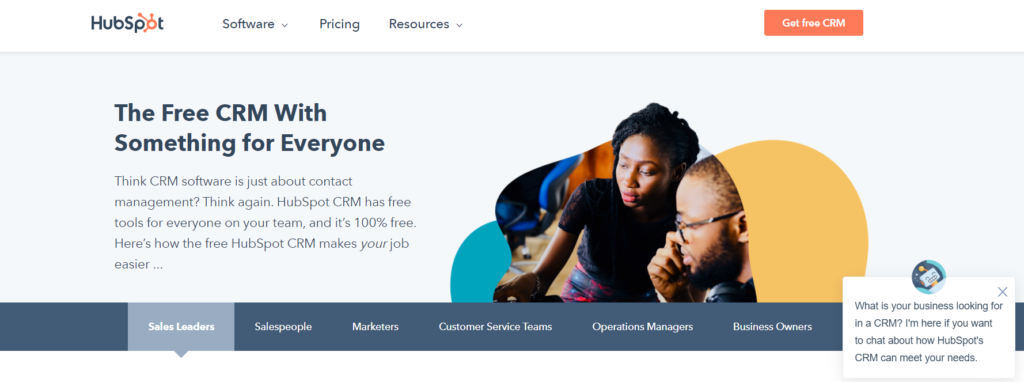
In the world of CRM, HubSpot is a big name and provides a free portal with minimal features. With lead management and cross-channel monitoring of customer transactions, it manages the fundamentals of the sales process. Integration with Zapier helps you to exchange data through platforms like Slack and Google Sheets.
With AI support, finer prospect insights, and high-end automation, the paying Sales Hub add-on for the CRM considerably raises the ante.
Inconveniences:
The customization options of HubSpot CRM are minimal, which could be a concern if you are doing anything very niche.
Costing:
- HubSpot CRM is open and there are no restrictions on the number of users. Add-on services for the Communication Center, Distribution Center, and Support Portal are $50 per consumer each month, paid annually.
- HubSpot CMS, paid weekly, begins at $300 a month. Starter Growth Suite all-inclusive starts at $113 per user/month, paid annually.
#2. Zoho CRM
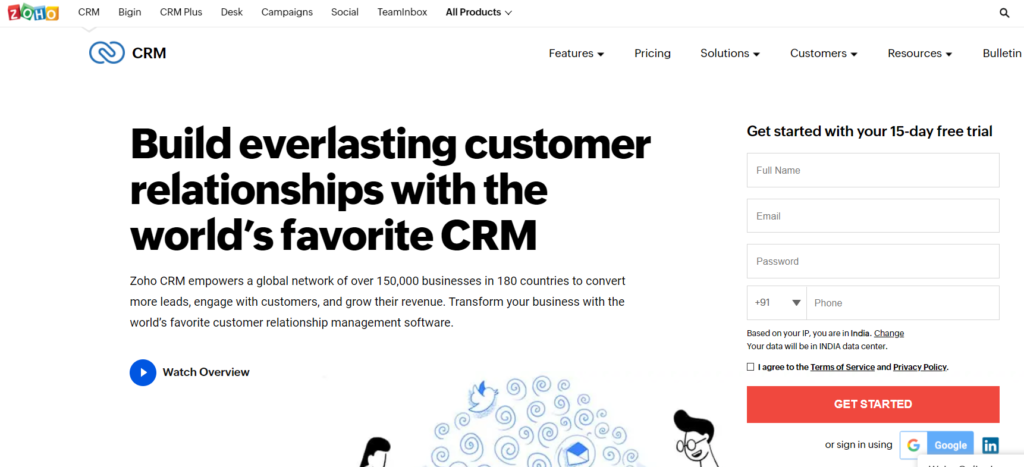
Zoho CRM is a Social media-savvy CRM with the development of workflow and tools for lead generation. Integrates into Twitter, Facebook, and Google+ so that leads can be engaged through different networks right on time.
For up to two users, Zoho CRM provides a free version. Advanced revenue forecasts and KPI monitoring are provided by Zoho’s Regular kit. The top-tier Business version provides features such as stage-by-stage analysis of revenue funnels and personalized comparisons of data for team segmentation, customers, territories, and much more.
Inconveniences:
The lack of individual email monitoring and individual lead alerts can be a challenge for sales reps that focus on one-on-one interaction and establishing a partnership.
Costing:
- The free version is available for up to three users and is aimed at domestic firms.
- The default version is $12 per user per month, paid annually,
- The Business edition paid monthly is $35 per user per month.
#3. Freshsales
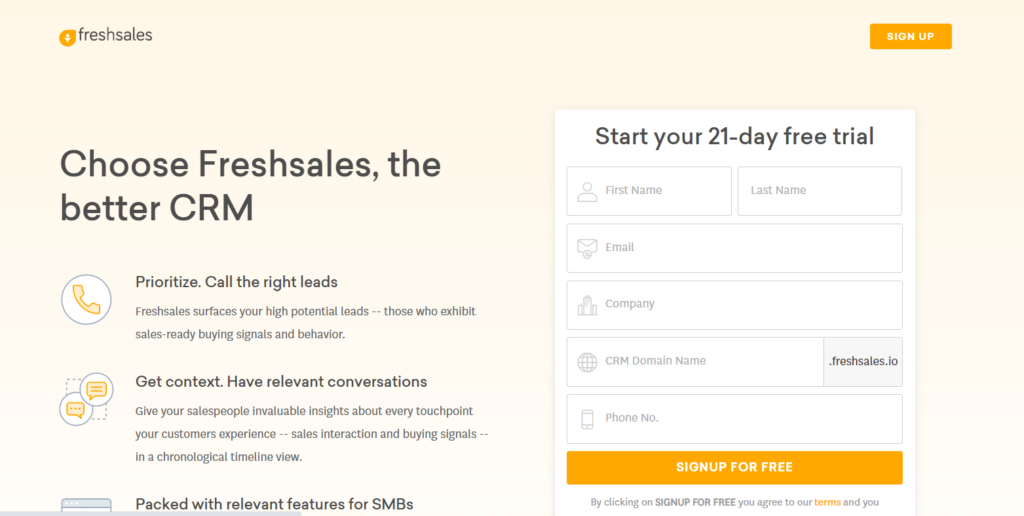
The CRM part of the robust customer experience suite for Freshworks 360 is Freshsales. The sales tools are useful for tracking transactions, reducing the repetitive manual entry of data, running sales email promotions, and bumping up efficiency in sales.
Lead capture takes leads from emails immediately and sticks them in the CRM. Lead scoring helps you to watch and sort individuals out, figure out who is most likely to move, and go for the best offers. There’s also a voice phone module with auto-dialing, call logging, and call routing integrated into the framework.
Inconveniences:
The method of handling roles is somewhat slow to concentrate on main connections. Few customers gripe that often customer service can be sluggish to solve problems.
Costing:
- Freshsales are available at 4 stages of functionality.
- For small teams, Blossom’s contract is $12 per customer per month, billed annually.
- For growing teams, the garden package is $25 per user / per month, billed annually.
- For broad teams, the estate package is $49 per customer per month, paid yearly.
- The enterprise forest package is $79 per user / per month, paid annually.
- All Freshsales plans have a 21-day free trial open.
#4. Salesforce
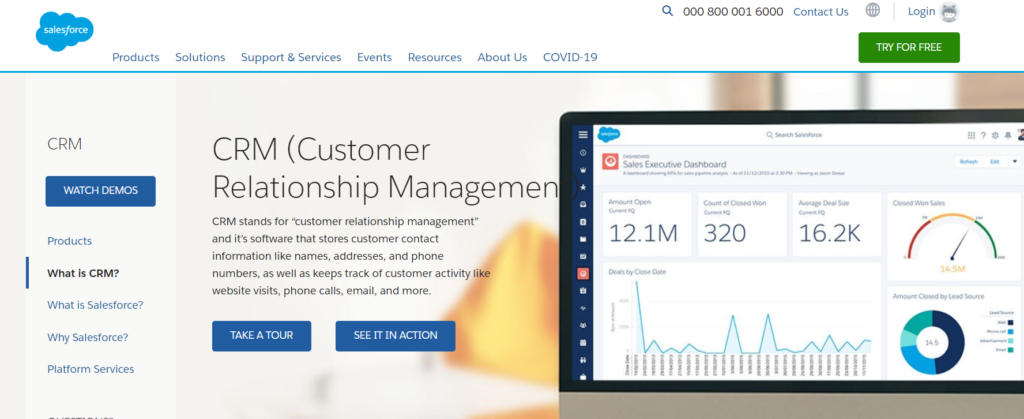
With deep, well-developed software for sales processes and team coordination and several integrations, Salesforce delivers a flexible CRM software. This is a comprehensive framework that enables very complex task management systems to be designed by project managers and sales teams. Many repetitive tasks and decision-making procedures are automated from the workday by Salesforce.
Inconveniences:
There is certainly a real learning curve, but this is somewhat mitigated by the detailed, well-designed ‘Trailhead’ lessons from the provider. No accessibility offline.
Salesforce is a company’s utter behemoth, and their size seems to have had some negative impacts on funding, i.e. It is not always super open to the CRM’s support desk.
The turnover of support staff makes it impossible to establish long-term, working relationships with particular members of the support team who know your business.
Costing:
- The simple all-in-one sales and maintenance package is $25 per customer per month, paid yearly.
- For any size party, the specialist package offering full CRM is $75 per user / per month, paid annually.
- Enterprise package supplying the enterprise with highly personalized sales CRM is $150 per user / per month, paid yearly.
- The “unlimited CRM power and help” unlimited package is $300 per device per month, paid monthly.
#5. Pipedrive
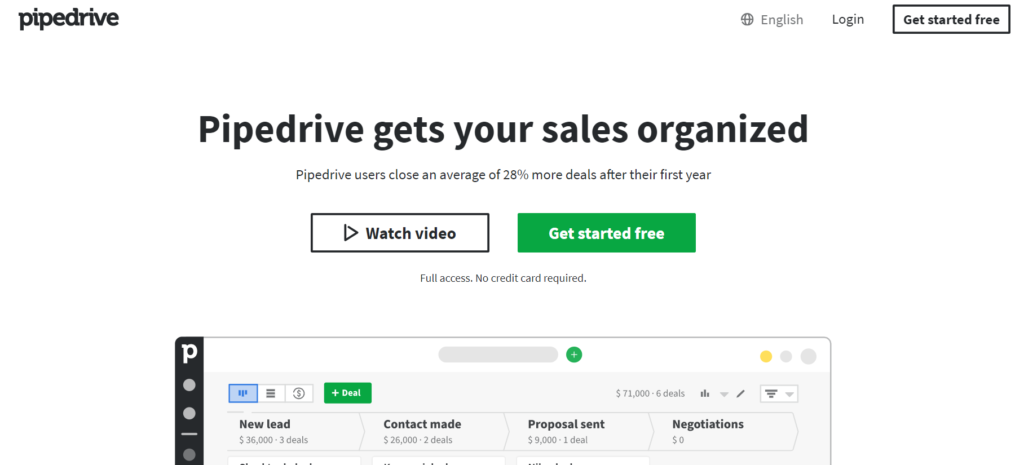
A simple-to-use, graphic tool based on the sales process and contract monitoring. Develop several sales pipelines and tailor phases for niche product and service contexts. Synchronizes cross-channel data and removes redundant admin roles.
Smart Email BCC will be used by consumers of Pipedrive’s Critical strategy to sync emails to Pipedrive. Advanced, Professional, and Business plan customers would have access to an in-app inbox and more advanced seamless email integration compliant with anything from Gmail to QQ Mail.
As a full-fledged Gmail CRM, a Chrome update enables you to access it. It can also be used as a project management platform with its app, resource and timeline filters, and summary functionality.
Inconveniences:
To get up and going, Zapier integration is a little complex.
Costing:
At four levels of functionality, Pipedrive is available.
- The Critical package is paid annually at $12.50 per user / per month, and weekly at $15.
- The Advanced package is paid annually at $24.90 per user / per month, and monthly at $29.
- The Technical package is paid annually at $49.90 per user / per month and weekly at $59.
- The Business package, payable monthly, is $99 per user / per month.
- The Important, Advanced, and Specialized plans have a 14-day free trial available.
#6. Nutshell CRM
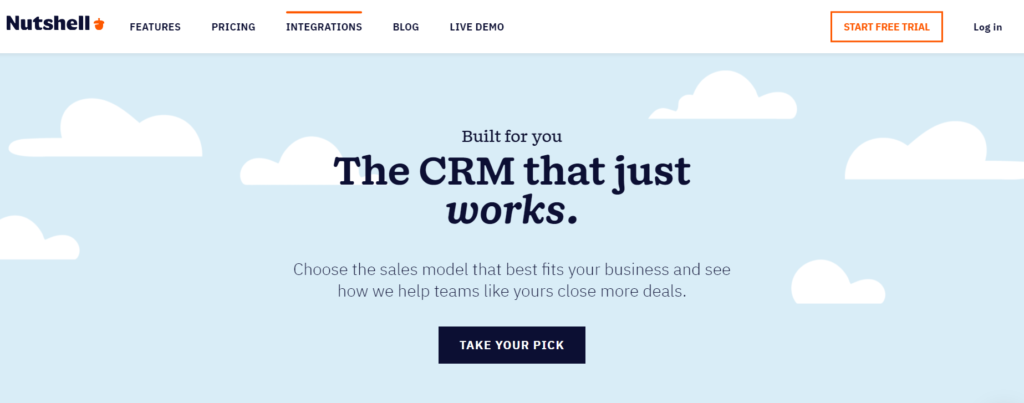
Nutshell, specially designed for small companies, lets you easily close orders. Nutshell also provides collaborative resources, personalized reports, and third-party integrations, in addition to traditional CRM functionality such as communication and lead management. If you use Google Applications, you’re still in luck; the program incorporates Gmail messages and events and meetings directly into Google Calendar. It promises quick deployment, too, so in no time you can get underway.
#7. Insightly
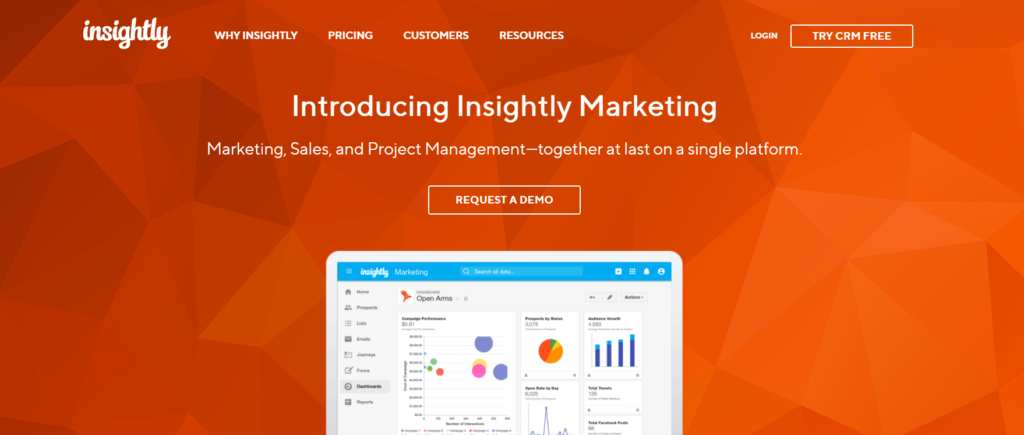
Insightly integrates with G Suite and Microsoft Office 365, so integrations with Excel, Outlook, and Gmail are all secured.
The CRM tool provides a highly integrated combination of sales pipeline tools for those in the sales sector, including client control, customer details, and lead monitoring. With to-do lists, it’s easy to delegate jobs to team members.
Business intelligence (BI) features are potentially very useful CRM features (powered by Microsoft Power BI). Inside the CRM platform, BI gathers historical and real-time data, meaning you have the knowledge you need to improve sales efficiency (i.e. reliable, measurable revenue patterns and analytics data). Concisely and clearly, Insightly designs the BI into dashboards.
Inconveniences:
Two-way sync can also be glitchy with Google Calendar. Custom touch fields are limited to 25, which is sufficient for certain individuals, but maybe a challenge for those with very complicated sales systems and business needs. A little more outdated is the user experience.
Costing:
- And, paid monthly, it is $29 per user / per month.
- Skilled, billed monthly, is $49 per user / per month.
- Enterprise, payable monthly, is $99 per user / per month.
- Plus and Skilled plans have a 14-day free trial available.
#8. PipelineDeals
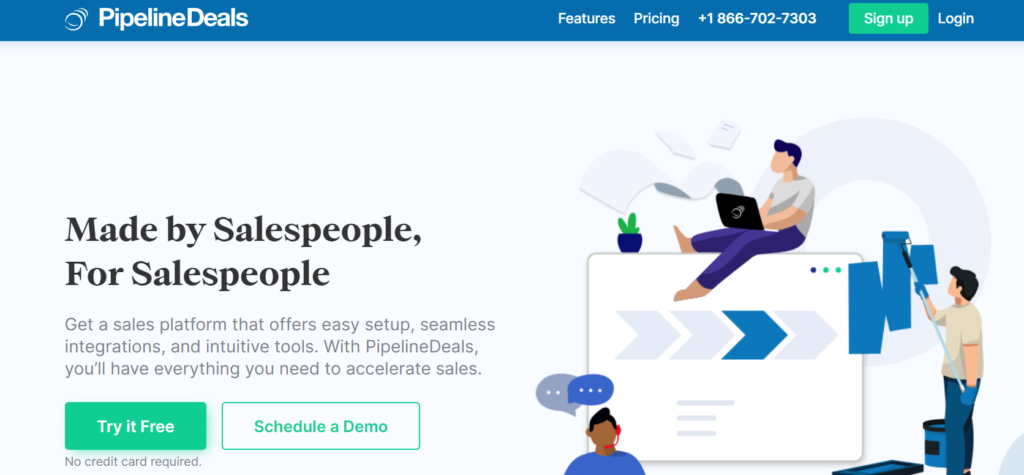
Pipeliner CRM is a sales CRM program designed not only for the consumer and the product, but also for consumers and clients, to have greater levels of interaction. A highly visual GUI with drag and drop functions, plus visual reporting and automation is supported by the framework.
One of the most significant aspects of Pipeliner CRM is that it operates even without a trained, full-time administrator. The app has an elegant, drag-and-drop GUI that takes just a few hours of preparation to learn, so any user can access the dashboard quickly. Users can access Pipeliner CRM features via the dashboard and change profile configurations if appropriate.
Costing:
- Starter-25 dollars / user / month
- Business-65 dollars / user / month
- Enterprise-85 dollars / user / month
#9. Agile CRM
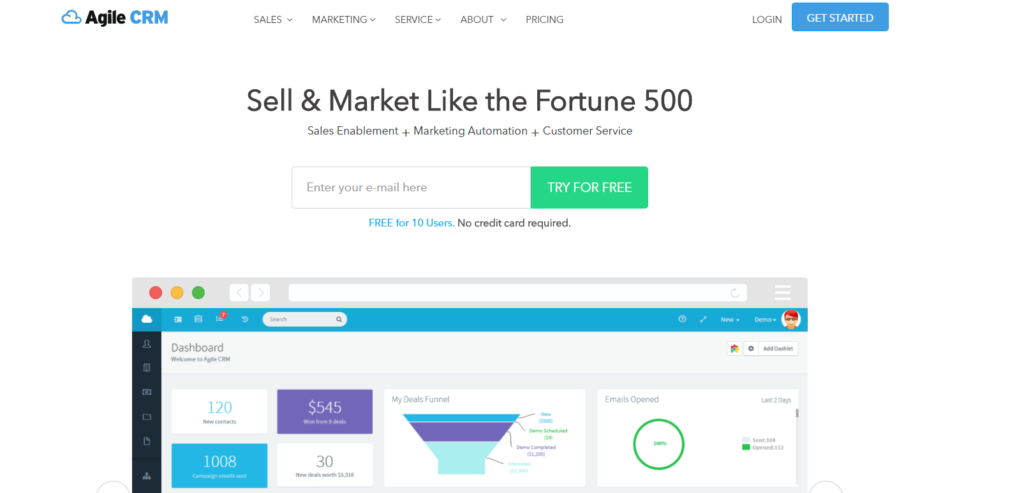
Full-featured sales CRM and automation capabilities. Hold your appointment plan online and all your future voice calls and follow-ups can be automated by Agile CRM. Keeps it all ticking along with a 360-degree touch vision, drag-and-drop project scheduling, posting, and timeline features. Add papers to in-app deals, businesses, addresses, and addresses.
Inconveniences:
In all models, which can be jarring and/or a deal-breaker as the business scales, the price raises drastically. Agile CRM does not offer several options for customization.
Costing:
- A free version for up to 10 users is available.
- The version of Starter is $8.99 per user each month (billed every two years)
- Per-user / per month, the standard edition is $29.99 (billed per two years)
- The Corporate edition is $47.99 (billed for two years) for every user / every month.